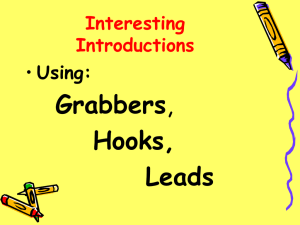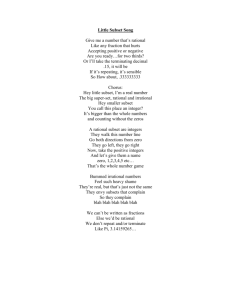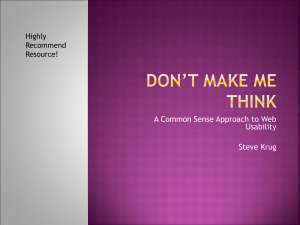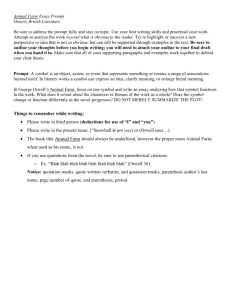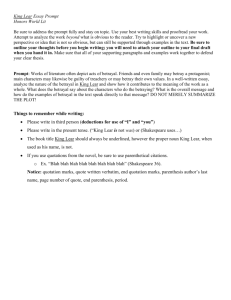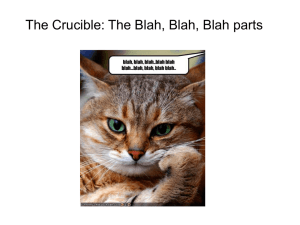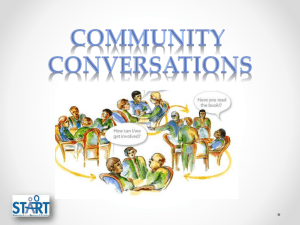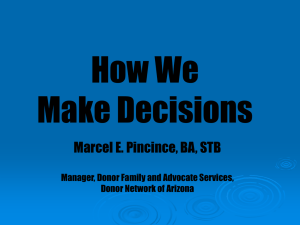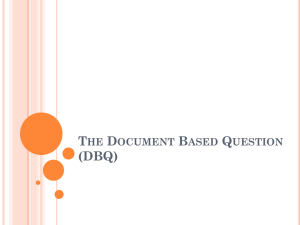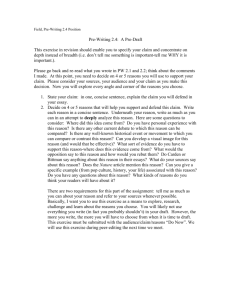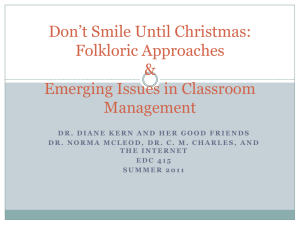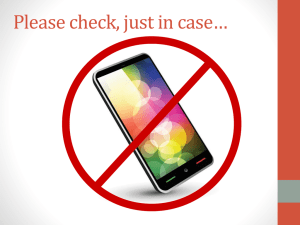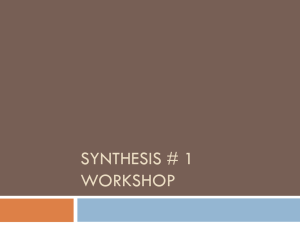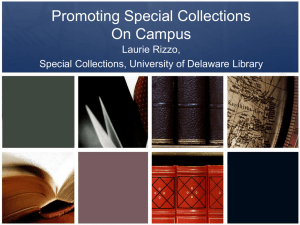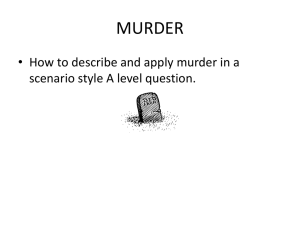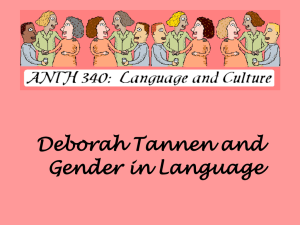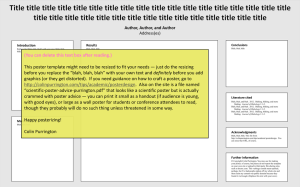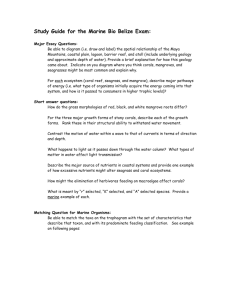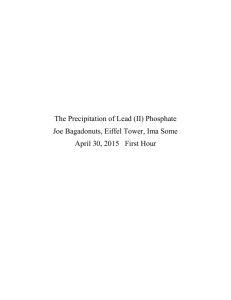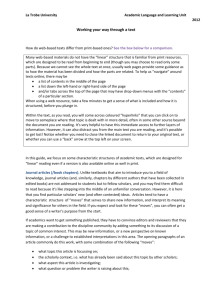Welcome to the Academic Conversation
advertisement
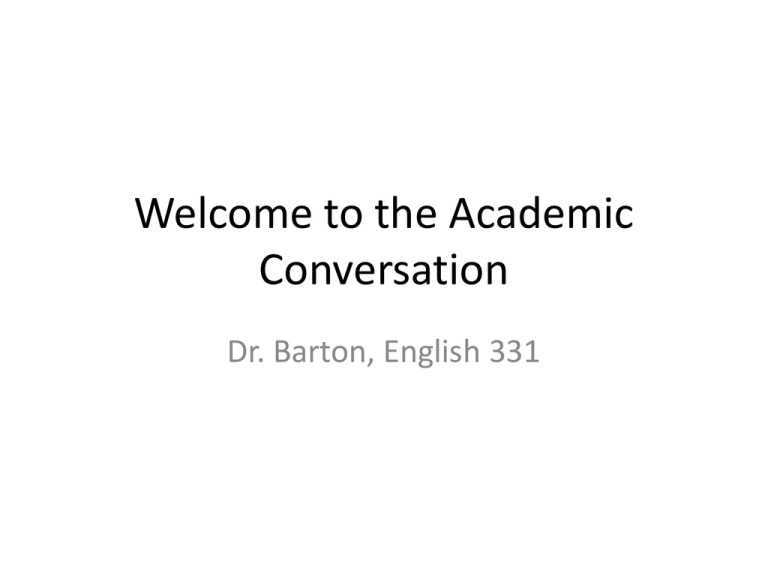
Welcome to the Academic Conversation Dr. Barton, English 331 Today’s Objectives • See academic writing as a conversation • Identify key traits of that conversation • Understand “inquiry” and how it differs from reporting • How to find any of this interesting Conversations • What are the characteristics of a good conversationalist? Good Conversational Skills • Show passion for the topic or issue at hand. • Be polite, friendly, and respectful to the other person at all times. • Ask questions and actually listen to the responses. • Show as much (if not more) interest in hearing the other person’s views as sharing your own. Joining a Conversation • Imagine a group of four strangers having a conversation about a subject that interests you. What’s the best way to join in? a) Butt in, announce yourself as the ultimate authority on the topic, and ask everyone to take notes as you begin to lecture. b) Stand there gawking, refuse eye contact, and pretend not to hear if anyone asks you what you’re doing there. c) Introduce yourself, listen for awhile to get a feel for the conversation, then make your point or ask a question when the moment is right. Group Activity • P. 19 in the book lists 8 different fields. – How do you imagine each of these fields would deal with these issues? • Steroid abuse • The mobile revolution Conversations to Academic Conversations • How do academic writers show respect to their readers? • How do they show they are as interested in listening as they are in speaking? • How can they be passionate about a topic without seeming overly-emotional or biased? They Say, I Say Starting with “I say” • [I say] SCSU should build a new weight lifting facility exclusively for athletes. • [I say] gun control is wrong because people need to be able to defend their homes from ninjas. The Basic Template • They say _____ – I say ______. • John Smith writes that “Blah blah” (42). However, – [I say that] blah blah is another possibility. • The Cornell study showed that 42% of blah blah was blah (12). – [I say] this result lends credence to my argument that blah blah. They Say, I Say • [They Say] U.S. citizens have seen a tremendous increase in political advertising, especially negative political advertising, thanks to increased polarization of voters—with a nod to ‘‘issue’’ politics—into mutually hostile camps and increased campaign spending (Ansolabehere & Iyengar, 1995; Jamieson,1996; Johnson-Cartee & Copeland, 1997; Thurber, Nelson, & Dulio, 2000). • [I say] Yet little research has been devoted to how citizens’ attention to negative campaign advertising, their perceptions of the effects of this type of advertising, and their voting preferences are related… They Say, I Say • [They say] Similarly, Elizabeth Murray, Hailey Sheets, and Nicole Williams (2010) found that “a significant number of composition instructors. . .feel uncomfortable assigning multimodal projects in their classrooms due to concerns with assessment” (para. 1). • [I say] The assessment of multimodal “texts” is not only a concern of the instructor, however. It is a crucial skill students need to acquire to succeed as writers. Learning to evaluate the effectiveness of a text is an important part of being able to write and read well. Group Activity • In your groups, find examples of “they say, I say” in the introductions of two different articles in the journal. General Traits • Traits of academic conversation: – Written within and for a specific discourse community (the academic field in question) – Careful attention to terminology and word choice – Credible and substantial support for all claims – Anticipation of possible refutations and problems with evidence and arguments – Necessary qualifications (in many cases; some studies suggest, etc.) The Problematic Trait • The big trait of academic conversation is inquiry: – Problematize terms. – Complicate or challenge “common sense” or widely accepted notions. – Struggle with uncertainty, doubt, or the unknown Myths about Student Writers • Students should write only to please a teacher rather than a potentially broader audience, such as a journal’s readership. • Students should view their writing merely as homework rather than something they do or could do professionally. • Students lack the knowledge or qualifications to write for a professional or scholarly audience. Homework 1. Find and write down at least two different academic journals from your field (mass comm, English, etc.) and who publishes them (a university, professional organization, etc.) 2. Do a survey of the last two years of each journal, scanning the titles of the articles for keywords and “hot” or recurring topics. Make a list of these. 3. Extrapolate from this list 2-3 questions or issues that are currently being explored by your field.
